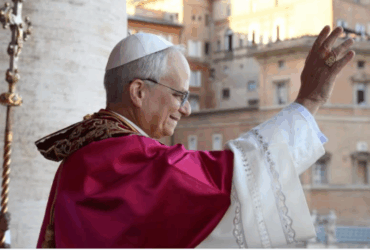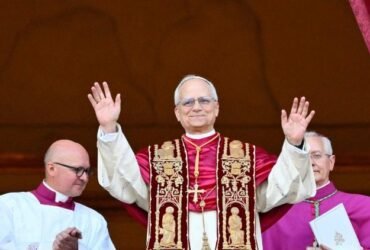Homily for the 4th Sunday of Easter – John 10:27–30
With the theme of leadership prominent in today’s Gospel, it is appropriate that we reflect on the great shifts in leadership that have taken place in our Church and in the world over the past few weeks. Most notable, of course, is the election of a new pope. As we celebrate Good Shepherd Sunday, we are invited to reflect on how the pope is a shepherd to us all. In many ways, it seems that Pope Leo XIV is set to shepherd the Church in much the same direction as Pope Francis has led us over the past 13 years. Pope Leo XIV is definitely a pastor who has the smell of the sheep.
What does it mean to “have the smell of the sheep”? I think this is best illustrated by the personal witness of Pope Leo XIV, particularly when he speaks about his time in Peru as a missionary. In a talk he gave last August—while he was still Cardinal Robert Prevost—he reflected on how his ministry among the people of Peru shaped the person he has become. He spoke of how he has received a hundredfold more than he has given as a pastor. I’m sure this is an experience shared by many pastors—and it’s certainly one I resonate with myself.
He also shared how Pope Francis chose him to lead the Dicastery for Bishops precisely because of his pastoral experience. Pope Francis didn’t want a Vatican insider; he wanted someone who had been a missionary—someone shaped by real pastoral engagement—to lead this important office responsible for appointing new bishops. Cardinal Prevost described the experience of church leadership as a deeply formative one, where your outlook on life, your priorities, and your values are shaped by the people you are called to lead and serve.
In the wake of Pope Leo XIV’s election, many have noted how the emergence of an American pope with such a humble, open, and cosmopolitan leadership style stands as a powerful counterpoint to the autocratic, ultra-nationalistic, and populist leadership style of President Trump. In President Trump, we see a self-made man who would likely never say that his leadership has been shaped by those he serves. You may wonder: isn’t populism precisely about appealing to “ordinary people”? How do we distinguish between populism and “having the smell of the sheep”?
Both styles of leadership aim to present a leader as being close to the people—but they do so in very different ways. Populism is marked by a divisive narrative: it pits “ordinary people” against a so-called “elite,” whose power and influence must be dismantled. Populism often appeals to the basest instincts in us, not to the informed conscience of individuals but to the mob mentality of a manipulated, angry populace. In such a view, the leader is not interested in individual lives, only in the mass—their collective power to sway polls and elections.
In contrast, the pastor who “has the smell of the sheep” listens not just to opinions, but to the lives and needs of his flock, as discerned in prayer. For it is not only the shepherd who listens to the sheep—Jesus tells us in today’s Gospel that “the sheep listen to his voice.” As Pope Francis has put it, sometimes the shepherd must lead from the front, sometimes walk among the flock, and sometimes follow behind, searching for the stragglers and allowing the sheep to guide the way.
In a world where social media can stir people into a frenzy of emotion, the voice of reason, compassion, and sound judgment may not always prevail. The Good Shepherd may have to speak difficult truths—truths his sheep do not want to hear. He must know when to listen to the flock, and when to challenge it in love.
Jesus also tells us that the Good Shepherd knows each of his sheep by name. He cares deeply for each individual, even those who have turned against him. Cardinal Prevost illustrates this beautifully in the same talk I referenced earlier. He recalled a moment during a private audience with Pope Francis, when the pope showed him one of his favorite images—a stone carving on the capital of a column in a French church. It depicts Jesus cradling the dead body of Judas after his suicide. Though not a biblical image, it is profoundly theological: Jesus, the Good Shepherd, holding even the one who betrayed him.
It’s been said that one of the surest ways to measure someone’s character is by observing how they treat their servants—especially those who dislike them. Jesus consistently showed concern for the little ones, those overlooked by society. As his followers, we are called to do the same, striving to be good shepherds in our own communities, households, and workplaces.
Questions for Reflection
1. Do I have the smell of the sheep of those who I am called to serve?
2. In what ways has my ministry of service to others shaped the person that I am?
By Fr Isaac Fernandez SJ










Leave a Reply